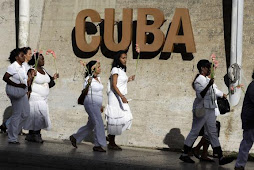Colombian president: Cuba summit invite unlikely
B ANDREA RODRIGUEZ
Associated Press
HAVANA -- Colombian President Juan Manuel Santos held talks with
President Raul Castro on Wednesday amid a controversy over whether Cuba
will be allowed to participate in a regional summit, but left indicating
that an invitation is not forthcoming.
Santos also visited convalescing Venezuelan leader Hugo Chavez, who
underwent cancer surgery in Havana last week, and said he seemed in good
spirits and was planning to return to Venezuela next week.
Members of the leftist Bolivarian Alliance, or ALBA, demanded last month
that Cuba be included in the April 14-15 Summit of the Americas in
Cartagena, Colombia, but stopped short of threatening a boycott while
urging Santos' government to extend an invitation.
As host, Colombia gets the final decision.
"As we have said from the beginning, (the summit) is a matter that
requires consensus, a consensus that unfortunately we have not been able
to find," Santos said at Havana's international airport Wednesday night
prior to departing.
"We made it clear to President Castro that although we truly appreciate
his desire to be part of this gathering, under such circumstances
without having reached consensus it is very difficult to extend an
invitation to him."
Santos thanked Castro for his expressing a desire not to create problems
for the summit or for Colombia, and also said he respects other nations'
wish for Cuba to take part in regional gatherings.
"Colombia hopes that the situation of Cuba, its participation, be
discussed in a constructive manner and respectfully at the Cartagena
summit. ... It is a matter that has been many years without a solution.
Colombian Foreign Minister Maria Angela Holguin told reporters that
during Santos' visit with Chavez, the Venezuelan leader indicated that,
health permitting, he will go to the summit and Nicaragua has also
confirmed its attendance. Both nations are members of ALBA.
"We hope that everyone comes," Holguin said.
Washington, a staunch supporter of Santos, opposes Cuban inclusion in
the Summit of the Americas. Santos has sought to maintain friendly ties
to Cuba, and his efforts to remain on good terms with Chavez have
dramatically set him apart from his predecessor.
The Summit of the Americas is historically linked to the Organization of
American States, and Cuba has not participated in the OAS since 1962.
But Cuba has expressed a desire to attend the Cartagena summit.
U.S. officials say Cuba, ruled since 1959 by brothers Fidel and Raul
Castro, does not meet OAS standards of democracy and thus has no
business taking part.
"They don't fit the definition of democratic countries and the
development of democracy in the hemisphere," U.S. Secretary of State
Hillary Clinton said last week at a hearing of the House Foreign Affairs
Committee. "So at this point we see absolutely no basis and no intention
to invite them to the summit."
Geoff Thale, an analyst at the Washington Office on Latin America, a
U.S.-based think tank, said the fact that Santos was going out of his
way to smooth over the flap, together with ALBA's support for Cuba,
shows that the region is increasingly willing to deviate from U.S.
international policy.
"The widespread support in Latin America for Cuba's participation in the
Summit, and the willingness of many governments to push the issue,
underscores the decline of U.S. influence in the region," Thale said by
e-mail.
In Havana, Santos and Chavez gave a green light to bilateral accords
that they were to have discussed on March 1 before Chavez's illness
interrupted plans to get together.
"We found (Chavez) in good health considering the circumstances he has
had to go through. We found him happy, in good spirits, walking around
the side of the hospital," Santos said.
"He told me he would stay a few days more (in Cuba) and planned to
return to Venezuela early next week."
ALBA, Chavez's brainchild, is made up of Antigua and Barbuda, Bolivia,
Cuba, Dominica, Ecuador, Nicaragua, St. Vincent and the Grenadines and
Venezuela.
---
Associated Press writers Peter Orsi in Havana and Vivian Sequera in
Bogota, Colombia, contributed to this report.
http://www.miamiherald.com/2012/03/07/2680767/colombia-president-in-cuba-to.html





No comments:
Post a Comment